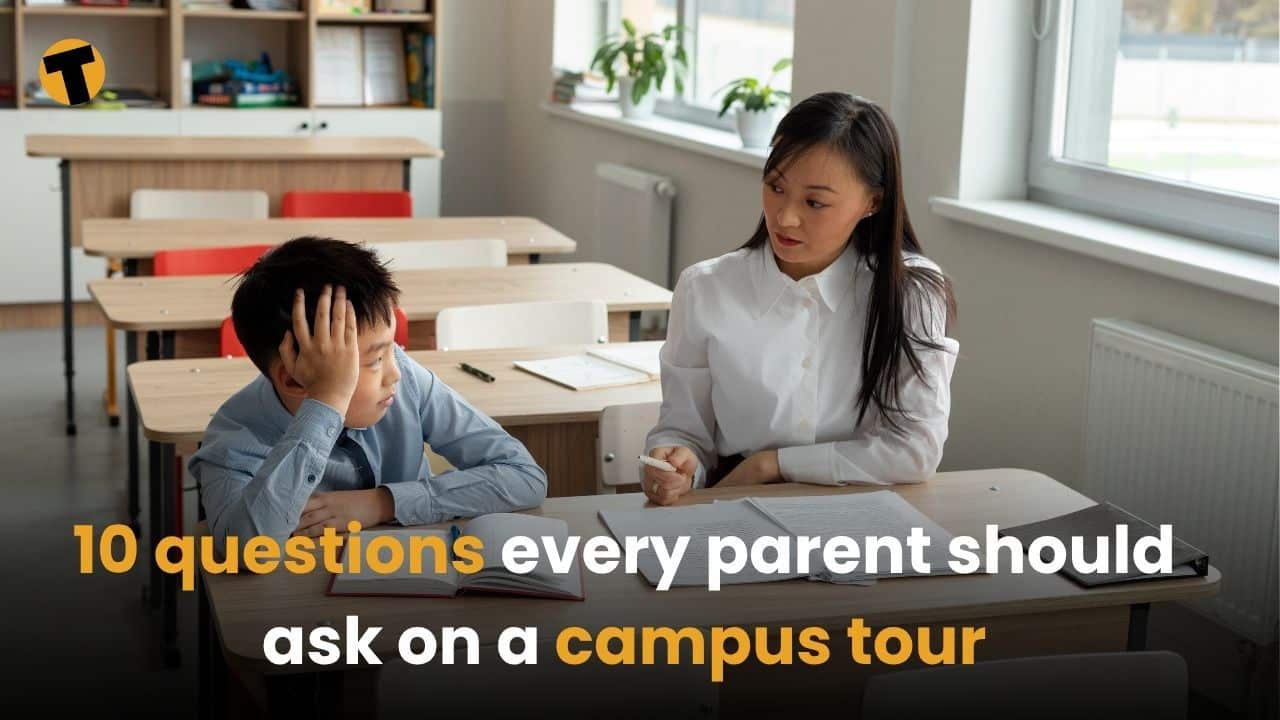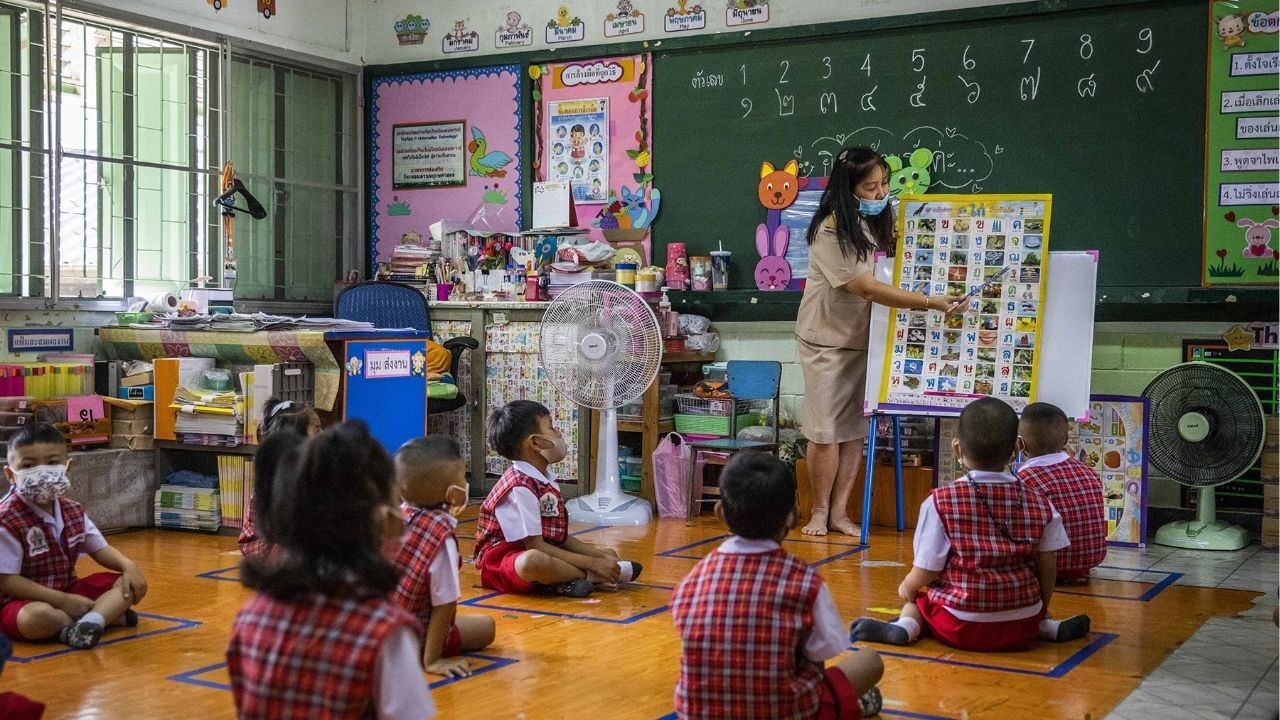Choosing a school in Thailand: 10 questions every expat parent should ask on a campus tour
A parent’s checklist for finding the right international or bilingual school in Thailand

Choosing a school for your child is one of the most important decisions you’ll make as an expat parent in Thailand. The right school can make a world of difference, not just academically, but emotionally and socially too. It’s where your child will spend most of their days, form their first friendships, and adjust to life in a new cultural environment.
Whether you’ve just arrived in Thailand or are considering a change, visiting schools in person is an essential step. A school tour gives you more than a first impression; it’s your chance to see how teachers interact with students, how classrooms feel, and whether the school’s atmosphere fits your child.
To help guide you through the process, here are ten key questions, both practical and personal, to ask during your next campus visit in Thailand

10 questions every parent should ask on a campus tour
| Question | Short summary |
|---|---|
| 1. What curriculum does the school follow, and how well does it bridge different systems? | Check if the curriculum fits your child’s background and supports transitions between systems. |
| 2. What is the student-teacher ratio, and how diverse is the student body? | Smaller classes mean more support; diversity helps children adjust and feel included. |
| 3. What qualifications and training do the teachers have? | Ask about certifications, experience, and ongoing training for quality teaching. |
| 4. How does the school handle language learning and multilingual development? | Strong ESL or multilingual support helps children adapt and learn confidently. |
| 5. What does a typical school day look like? | Review daily schedules, homework, and how study time balances with rest. |
| 6. How does the school support students’ emotional well-being? | Look for counselling, pastoral care, and anti-bullying programmes. |
| 7. How are learning differences or special educational needs (SEN) supported? | Ask about SEN teams, IEPs, and what resources are available. |
| 8. What extracurricular and holistic development opportunities exist? | Check for clubs, sports, arts, and community projects that build confidence. |
| 9. What is the school’s record with university placements or next steps? | See where graduates go and what support the school gives for applications. |
| 10. How involved can parents be in the school community? | Look into parent groups, events, and communication channels. |
1. What curriculum does the school follow, and how well does it bridge different systems?
Start with the foundation. Thailand offers a wide range of schooling options, from Thai national curriculum schools to international institutions following British, American, or IB (International Baccalaureate) programmes.
You can also ask about:
- How the school supports transitions between systems (for example, British to IB).
- Whether your child will need additional support after transferring from abroad.
If you’re considering a Thai public school, note that lessons are taught mainly in Thai and may not suit older children unless they are already fluent.
2. What is the student-teacher ratio, and how diverse is the student body?
This helps you assess both academic support and social comfort and a smaller ratio means more personal attention, while diversity within the student body can help your child settle in faster.
In international schools, a mix of nationalities is often a selling point, where you could ask for details or percentages if you are interested. In bilingual or semi-private schools, the majority of students may be Thai, creating a more local environment.
3. What qualifications and training do the teachers have?
Parents often assume international schools only hire native English-speaking teachers, but that isn’t always the case.
You can also ask about:
- Are teachers certified in their home countries?
- Does the school provide ongoing professional development?
- Are Thai teachers teaching key subjects in English?
For secondary students, subject expertise and teaching experience make a real difference to exam performance and confidence.
4. How does the school handle language learning and multilingual development?
Language plays a key role in your child’s success and confidence.
You can also ask about:
- What support is available for non-native English speakers?
- Is Thai language instruction mandatory?
- Are other foreign languages, such as Mandarin or French, offered?
For younger students, strong ESL (English as a Second Language) or EAL (English as an Additional Language) programmes can make the transition smoother and more enjoyable.
5. What does a typical school day look like?
You can also ask about:
- Start and finish times
- Lunch and snack breaks
- Number of lessons per day
- Homework expectations
For early years and primary students, daily balance is key. For older ones, look for a healthy mix of academics, creative activities, and rest.
6. How does the school support students’ emotional well-being?
Moving to a new country can be exciting, but it can also bring uncertainty. Schools that prioritise emotional support can make all the difference.
You can also ask about:
- Pastoral care or counselling services
- Bullying prevention policies
- Mental health and inclusion programmes
A good school nurtures more than academic success — it builds confidence, empathy, and resilience.
7. How are learning differences or special educational needs (SEN) supported?
If your child needs extra help, it’s best to discuss this early.
You can also ask about:
- Does the school have a learning support team?
- Are Individualised Education Plans (IEPs) available?
- Is there an additional cost for SEN support?
Smaller or public schools may have limited resources, so understanding the level of support available will help you choose wisely.
8. What extracurricular and holistic development opportunities exist?
A well-rounded education extends beyond academics.
You can also ask about:
- After-school clubs and activities
- Music, drama, and sports programmes
- Leadership or community service opportunities
These experiences encourage creativity, teamwork, and personal growth — qualities that go hand in hand with academic learning.
9. What is the school’s record with university placements or next steps?
For families with older children, this is essential. If the school offers IB, A-Levels, or similar diplomas.
You can also ask about:
- Where have recent graduates gone to university?
- Does the school assist with applications (UCAS, Common App, etc.)?
- Are Thai universities an option for graduates who want to stay?
Even if your child is younger, knowing the school’s long-term direction can help you plan.
10. How involved can parents be in the school community?
Your participation can make a big difference.
You can also ask about:
- How the school communicates with parents
- PTA (Parent-Teacher Association) opportunities
- Family events and volunteering
A connected parent community can be a great source of friendship, advice, and support — especially for those new to Thailand.
A note on Thai public schools

While many expat families prefer international or bilingual schools, Thai public schools, especially demonstration or satit schools linked to universities, can be affordable and reputable choices for bilingual or younger children.
However, English instruction is limited, and cultural adaptation is important. Parents should consider their child’s language level and personality before enrolling.
Choosing a school in Thailand isn’t just about academics or facilities. It’s about finding a place where your child feels safe, supported, and inspired to learn.
During your school tour, take your time. Observe the atmosphere, speak with teachers and students, and imagine your child there.
Ask every question that comes to mind, even the hard ones, because when it comes to your child’s future, every question truly matters.
ดูโพสต์นี้บน Instagram
The Thaiger key takeaways
- Visiting schools in person helps expat parents assess the curriculum, facilities, and environment before enrolling their child.
- Ask about class sizes, teacher qualifications, and emotional support to ensure a balanced and nurturing experience.
- International and bilingual schools in Thailand offer diverse options, but the best choice depends on your child’s needs, language level, and comfort.
Latest Thailand News
Follow The Thaiger on Google News:


























